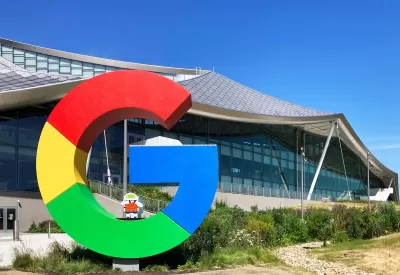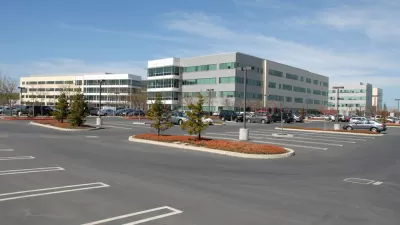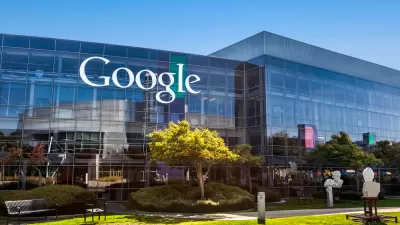The company parted ways with its development partner, signaling a shift in strategy for a proposed 15,000-unit housing and office space project on Google-owned land in Silicon Valley.

A partnership between Google and developer LandLease has dissolved, placing into question a plan to build 15,000 housing units to alleviate the Silicon Valley housing crisis perpetuated by tech giants.
As Nate Berg reports in Fast Company, “The projects, announced last year, were intended to transform large swathes of Google-owned land in San Jose, Sunnyvale, and Mountain View into four dense, walkable, mixed-use neighborhoods.”
While the ocmpanies call the move a “strategic redirection,” Berg writes, “It’s hard to not read between the lines of this partnership’s dissolution, especially for a high-profile project that had aims to build many units of housing alongside ample office space.” For Berg, “Google and Lendlease parting ways suggests that large projects that are anchored to office developments—even ones as needed as dense housing in one of the country’s most expensive markets—will require some significant reconsideration.”
A Google spokesperson said the company is looking for new partners to move forward with the project. “That Google’s Arena refers to this next phase as delivering on Google’s “housing commitment” may indicate that its next steps are less focused on the commercial side of the original plan.”
FULL STORY: Google’s plan to build 15,000 new homes in Silicon Valley just got more complicated

Study: Maui’s Plan to Convert Vacation Rentals to Long-Term Housing Could Cause Nearly $1 Billion Economic Loss
The plan would reduce visitor accommodation by 25,% resulting in 1,900 jobs lost.

North Texas Transit Leaders Tout Benefits of TOD for Growing Region
At a summit focused on transit-oriented development, policymakers discussed how North Texas’ expanded light rail system can serve as a tool for economic growth.

Why Should We Subsidize Public Transportation?
Many public transit agencies face financial stress due to rising costs, declining fare revenue, and declining subsidies. Transit advocates must provide a strong business case for increasing public transit funding.

How to Make US Trains Faster
Changes to boarding platforms and a switch to electric trains could improve U.S. passenger rail service without the added cost of high-speed rail.

Columbia’s Revitalized ‘Loop’ Is a Hub for Local Entrepreneurs
A focus on small businesses is helping a commercial corridor in Columbia, Missouri thrive.

Invasive Insect Threatens Minnesota’s Ash Forests
The Emerald Ash Borer is a rapidly spreading invasive pest threatening Minnesota’s ash trees, and homeowners are encouraged to plant diverse replacement species, avoid moving ash firewood, and monitor for signs of infestation.
Urban Design for Planners 1: Software Tools
This six-course series explores essential urban design concepts using open source software and equips planners with the tools they need to participate fully in the urban design process.
Planning for Universal Design
Learn the tools for implementing Universal Design in planning regulations.
City of Santa Clarita
Ascent Environmental
Institute for Housing and Urban Development Studies (IHS)
City of Grandview
Harvard GSD Executive Education
Toledo-Lucas County Plan Commissions
Salt Lake City
NYU Wagner Graduate School of Public Service




























